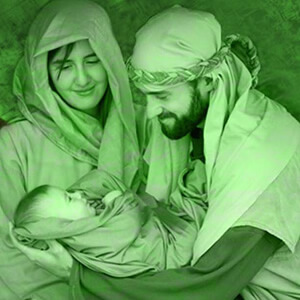We invite you to return every day during Advent for this devotional series
Listen to today’s accompanying audio track:
For Unto Us A Child Is Born
Isaiah 9:6

government shall be upon His shoulder; and His name
shall be called, Wonderful, Counsellor, The mighty God,
The everlasting Father, The Prince of Peace.”
TEXT
It is difficult to read these lines of Isaiah’s prophecy without hearing Handel’s unforgettable chorus singing in our ears. Here are joyous words about a little child. God does not defeat the powers of darkness by mighty armies, but by a child newly born. In the original Hebrew text Isaiah places emphasis upon the word “child” by putting it at the beginning of the sentence. He wants to underscore that it is by a child that God accomplishes His saving work.
This child born is the One whose birth was earlier prophesied: “Behold, a virgin shall conceive and bear a son, and shall call His name Emmanuel, God with us” (Isaiah 7:14). God does not take on the darkness from His high and lofty position, but by coming to us as a helpless baby. God’s answer to all that threatens is a child born to us, and a son given.
Isaiah is careful and precise in his wording: the “child born” points to Messiah’s humanity, while the “son given” points to Messiah’s deity. It is not the “son” who is born, or the “child” that is given, but the “child” who is born, and the “son” who is given. The child is born just as we are born, but the Son is eternal, and thus given by God to us.
This child both God and human is: “Wonderful, Counsellor, The mighty God, The everlasting Father, The Prince of Peace”. These five names are best thought of in the context of Isaiah’s time when pharaohs and kings were given “throne names”. The throne names were different than their personal names, and used to describe the nature of their reign. While Messiah Jesus never bore these actual throne names in His life, they accurately describe the nature of His reign.
When we behold the little baby in Bethlehem’s manger, we are seeing “God with us”. We are seeing the one who is “Wonderful, Counsellor, The mighty God, The everlasting Father, and The Prince of Peace”.
The best summary of all these wonderful names is found in the one name, Jesus: “salvation is of the Lord”. He is the baby of whom the angel said: “Thou shalt call his name Jesus: for he shall save his people from their sins” (Matthew 1:21).
This is not only the birth of a baby, but also a gift. He is a child born “unto us”. This is the language of gift-giving. He is God’s gift to the world, given with the longing that we will receive Him.
Martin Luther preached a Christmas Day sermon in 1531 in which he talked about our need to receive Jesus as God’s gift to us.
You heard yesterday how this child belongs to us and how we are to receive him in order properly to understand this article of faith: ‘Conceived by the Holy Spirit and born of Mary.’ We are always to add, ‘For us.’ For whom was he conceived and born? For whom did he suffer and die? For us, for us, for us! Always add us…But it is not enough that he is ‘born’ to us; he is also ‘given’ to us. What does ‘given’ mean? He is a gift, a present.
Receive God’s gift and you will find Him Wonderful. Receive God’s gift and He will you be your Counselor, guiding and showing the way. He will be the Mighty God who protects and keeps you. As the Everlasting Father, He will love you forever. As the Prince of Peace, He will give you peace: peace with God, and peace in your heart.
MUSIC
With this triumphant chorus we reach one of the high moments of Messiah, and the climax of the first section. The chorus is one of the most memorable and beloved of all choral works. Even people who can’t sing a note feel themselves wanting to join in.
The recitations of Old Testament prophecies have built to the announce-ment of Emmanuel’s birth. The voices swell to a full chorus celebrating Messiah.
Handel clearly wants to stick close to the text as he repeats it four times with four voice parts. The sopranos begin the melody heralding Messiah’s coming. The tenors join in as the sopranos continue in a joyful flourish on the word “born”. A striking part of the singing is the vocal gymnastics of stretching the one syllable “born” over a group of notes, a technique called melisma. This 57 note stretching out of “born” is the longest melisma ever written. This Baroque style of composition is repeated throughout the chorus in all four parts, conveying lightness and joy.
The altos follow, and then basses, rejoicing in the news of Messiah’s birth. At one point all the women’s voices sing the good news as the men respond in sheer amazement.
Handel saves the full chorus and orchestra for emphasizing the throne names of Messiah. The music pauses after each name to punctuate what has just been sung. All four voice parts name the child by these divine titles as the strings rejoice with them.
The “government” the child bears on His shoulders is emphasized with dotted rhythm. Altogether the chorus sounds like a joyous dance celebrating Messiah.
PRAYING MESSIAH
- What do you sense that God might be saying to you in today’s Scripture text and music from Messiah?
- What do you want to say to God?
- Now take a few moments to be still in God’s presence.


